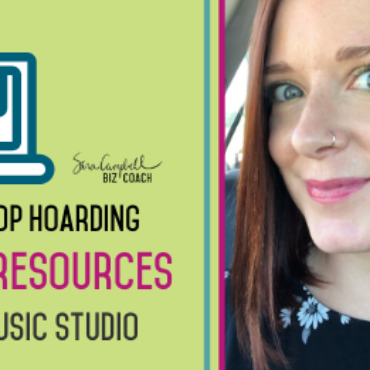12 Days of Inspiration Day 7: Seven Tax Deductions for Music Teachers
Welcome to Day 7 of the 12 Days of Inspiration! So far you’ve learned about ways to reduce stress, focus your goals, and even what should happen at a first piano lesson.
Today we’re going to talk taxes. (Yippee!)
I know that taxes aren’t inspiring or fun… but I can promise you this: you will feel like a champion when deductions lower your tax bracket or (GASP) actually get a tax refund at the end of the year.
(Note: There’s been a lot of talk about the new tax law that was passed in December, but keep in mind: your 2017 taxes won’t be filed under the new tax law. That will go into effect next year! And I’ll be sure to give you the scoop about these very soon.)
Without further ado, here are some deductions that every music teacher should know about.

7 Tax Deductions for Music Teachers:
- Business Insurance and Health Insurance. General liability insurance, equipment insurance, and health insurance are deductible. These are “above-the-line” deductions that come off your gross income before it’s calculated to adjusted-gross-income. Speaking of insurance, did you know that most homeowner’s insurances won’t cover expensive musical instruments? If you’ve invested in a high end instrument, you also need to investigate whether or not your homeowner’s will pay for a fair replacement should a tragedy occur. If it doesn’t, then you need a personal articles inland marine floater policy. See more about those here.
- New Equipment. Did you know that you don’t have to depreciate expensive items such as pianos, cellos, or computers? Section 179 allows you to deduct the full amount in a single year, up to $500,000. Why does this benefit you? Because it’s like getting a discount on your purchase. Example: Sally purchases a grand piano for her studio. The cost is $60,000. Using Section 179, she writes off the full amount of the instrument. Assuming her tax rate is 35%, she basically saved $21,000 on her purchase. Don’t let those big numbers scare you. The same applies for smaller purchases like laptops and iPads.
- Travel and Education. If you have a car that’s ONLY used for piano lessons, you don’t have to track mileage. Just do me a favor and call your car the “Piano Mobile” and make sure to get some sweet wrap around vinyl graphics. BUT… if you don’t have a Piano Mobile, there are lots of apps out there that can help you keep track or mileage: MileIQ , MileBug, and Everlance to name a few. You can deduct a percentage of your car expenses such as gas, repairs, insurance, etc. based on the mileage you log. Speaking of traveling… that really cool conference you were eyeing up can actually be a sound investment for your tax deductions. Be sure to keep all your receipts for travel, lodging, and meals! And if traveling isn’t your deal, you can also deduct online eduction like Upbeat Piano Teacher Webinars too.
- Contract Labor. Let’s say that you hired an accompanist or sound technician for your spring recital. Or maybe you hired another teacher to help you with a summer camp. These costs are deductible! Remember that if you pay an independent contractor $600 or over, you’ll need to issue them a Form 1099-MISC. Make sure to keep receipts for these payments: I often ask my IC’s to send me invoices so that it’s easy for me to keep a solid record.
- Home Office. If you teach out of your home, you can deduct direct and indirect costs for your studio space. Direct costs, such as repairs or home office equipment, are fully deductible. Indirect costs like utilities and mortgage interest are only partially deductible. There are different ways to go about this type of deduction, so make sure to do your research (or better yet, ask your accountant what would make the most sense for you!)
- Retirement. Self-employed individuals can write off contributions to qualified retirement plan accounts as personal deductions on Form 1040. And if you don’t have a retirement plan yet, I sincerely hope that this deduction gets you moving towards one. Music teachers shouldn’t have to work into their 80s unless they want to. Check out these 4 Retirement Options for the Self-Employed.
- State and Local Taxes. Keep track of your state and local taxes so that you can deduct them from your federal taxes. When I pay my quarterlies, I keep copies of the forms and check duplicates. Even better: I don’t have to hunt down all the forms and figure out who gets owed what. My accountant gives me everything I need to file quarterlies, including addressed envelopes.
And here’s more BONUS deduction to keep in mind: You can deduct the costs involved with filing your taxes, so there’s no reason to scrimp. The best thing you can do is to hire a qualified professional. Or at least get the pro-version of whatever tax software you might use. You’ll really thank yourself later!
When it comes to 2018 taxes, don’t panic.
We’ll have time to figure this out, and I’ll be sure to post more about this topic as I get a better understanding of it myself. Subscribe (right hand column) to get more helpful music teacher advice delivered right to your inbox.
More Posts from the 12 Days of Inspiration:
- 1 Powerful Way to Stay Focused and Productive at Colourful Keys
- 2 Things Every Music Teacher Should Do on Their Break at Mallory’s Music Studio
- 3 Ways to Reduce Stress at Music Educator Resources
- 4 New Year’s Resolutions at Violin Judy
- 5 Ways to Reset Your Music Studio After the Holidays at Pianosaurus Rex
- 6 Things That Should Happen at a First Piano Lesson at A Very Piano Blog.
- 7 Tax Deductions for Music Teachers at Sara’s Music Studio.
- 8 Questions to Bring Your Studio into the New Year at FunKey Music.
- 9 Ways to Increase Your Studio Retention at Woods Piano Studio.
- 10 Impressive Benefits of Learning Piano by Ear at Piano Picnic.
- 11 Finds for the New Year at Piano Pantry.
- 12 Tips for Teaching Tricky Personalities at Let’s Talk Piano.
What else am I up to nowadays?
Right now I’m gearing up for the Online Lesson Academy! We sold out of our February session, but there’s still room (for now) in our March session! You can learn more here.





![Let’s Chat Branding, Baby [Vlog]](https://sarasmusicstudio.com/wp-content/uploads/2019/06/Screen-Shot-2019-06-12-at-12.39.00-PM-370x370.png)